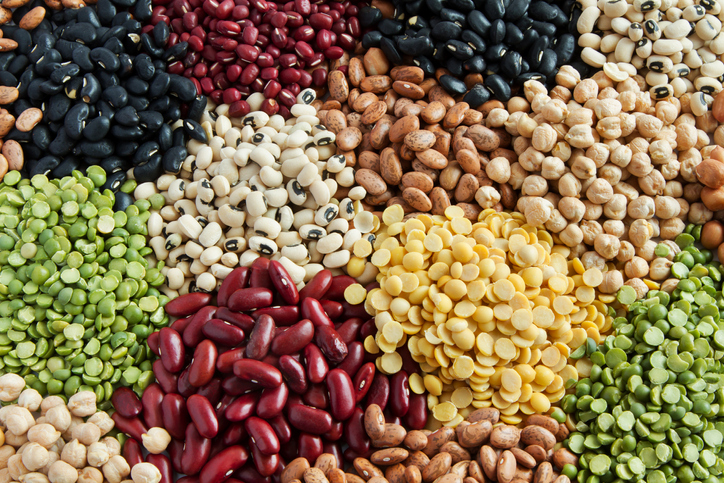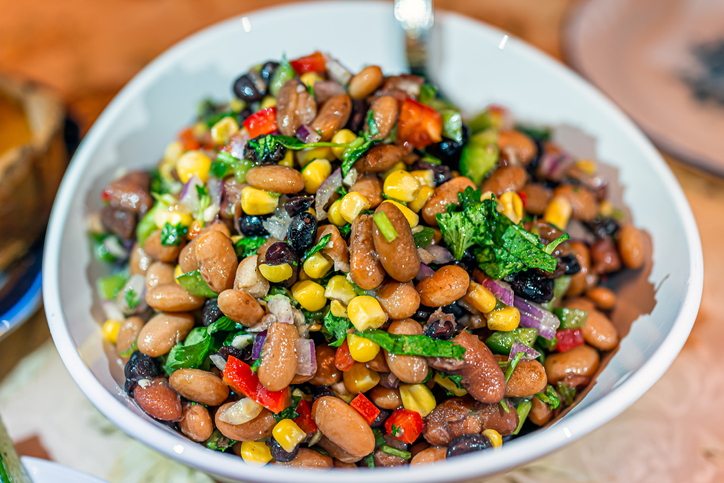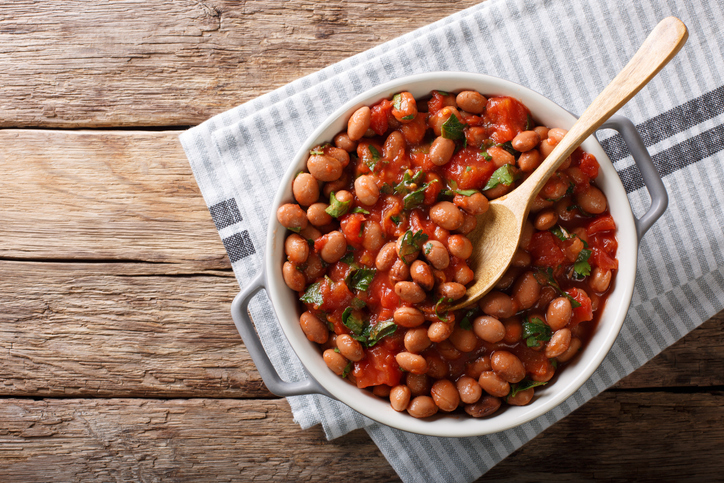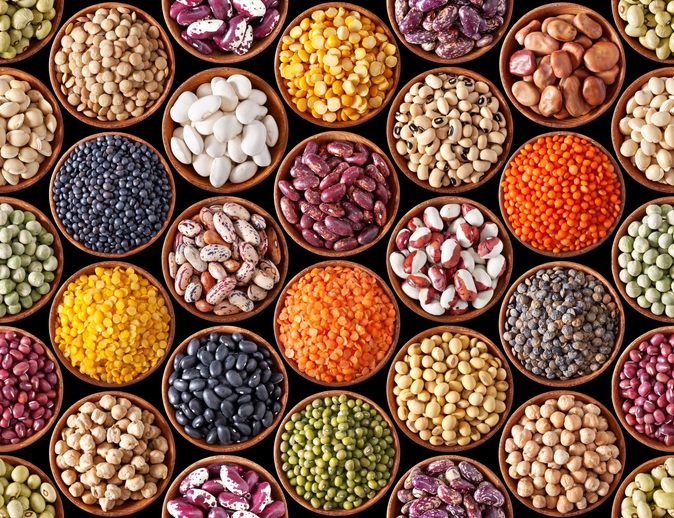Beans come from the Fabaceae family, known as the pea, legume, or bean family. Beans either grow in pods or capsules that develop from flowers. Some legumes include peanuts, peas, and lentils, which can be bought dry, canned, or frozen. For some beans, only the seeds are edible, while some have their entire pod edible.
They are nutritional powerhouses packed with fiber, protein, iron, vitamins, and other minerals that offer different health benefits. Beans are also rich in amino acids, which are the building blocks of protein that the body uses to heal and create new tissues.
Varieties

Beans exist in many different kinds, and each kind is used in something different. The versatility of beans makes them the best kind of legume to get our daily intake of protein, vitamins, and iron. They are a great source of fiber too.
There are several kinds of beans. The most popular varieties include:
- Lima beans
- Black beans
- Kidney beans
- Garbanzo beans
- Soybeans
- Black-eyed peas
- Pinto beans
- Red beans
- Navy beans
- Edamame beans
Nutrients You can Get from Beans
As mentioned earlier, beans contain vital nutrients and minerals that our body needs to function. Here are some of them:
Protein
Beans are a great way to get your low-calorie, low-fat protein. Protein is an essential nutrient that plays a key role in maintaining and repairing the body. It’s an excellent source of protein for vegans and vegetarians. Beans are high in amino acids, the building blocks of protein. There are two types of protein sources: complete and incomplete. However, of all the types of beans, only soybeans have all the nine essential amino acids. On average, beans contain 15 grams of protein in a single cup.
You can combine incomplete proteins with seeds, nuts, grains, or dairy at a single meal or throughout the day so you can consume complete proteins. You can have black beans with cheese and almonds, or eat your beans with rice or couscous.
Fiber
Beans are rich in fiber. It’s a great addition to your meals because most Americans don’t get the recommended 25 to 38 grams of fiber per day. Fiber aids in digestion and helps protect against heart disease, high blood pressure, and high cholesterol. A cup of black beans contains about 17 grams of fiber, while navy beans have about 19 grams of fiber per cup.
Folate
This B vitamin is essential for overall health. It stimulates the creation of healthy red blood cells and prevents birth defects in a fetus during pregnancy. Folate is also good for heart health, the nervous system, and cell division. A cup of pinto beans contains about 300 micrograms of folate, which is already 75% of the recommended daily amount. Meanwhile, a cup of shelled edamame beans provides 482 micrograms of folate.
Zinc
The cells in our body need zinc to make genetic material, fight off germs, and heal wounds. For children, zinc is important because it helps develop the sense of smell and taste. A cup of garbanzo beans comes with 2.4 milligrams of zinc, which is a quarter of what you need for the day.
Iron
Iron is used by the body to make blood proteins that help move oxygen around the body. It’s an important nutrient for the hormones and connective tissues. A cup of soybeans contains about 9 milligrams of iron.
Potassium
Potassium is needed by almost everything in your body, including your kidneys, muscles, nerves, and heart. Not many people know this, but beans are actually rich in potassium, especially lima beans, which contain a thousand milligrams per cup. That’s twice the potassium that you can get from a banana.
Magnesium
Magnesium helps makeup proteins and bones, and it stabilizes blood sugar. Black beans are high in magnesium, containing 120 milligrams per cup, which is a third of the recommended daily amount.
Antioxidants
Beans are also found to be rich in polyphenols, a type of antioxidant. Antioxidants combat the effects of free radicals, which can cause cell damage resulting to various diseases. Because of this, antioxidants help protect the body from diseases.
Benefits of Beans

Beans are good for the body. These are packed with health benefits, including:
1. Improves heart health
Studies have shown that people who eat beans daily are less likely to develop cardiovascular diseases or heart failure. In a 2017 study, people switching from animal fat proteins to beans have been shown to decrease their risk of developing cardiovascular diseases. It is because the nutrients in the beans can lower your LDL or bad cholesterol. There is also evidence that eating a high-fiber diet such as beans helps reduce the risk of cardiovascular disease.
2. Reduces risk of cancer
Since beans contain antioxidants and anti-inflammatory agents, they could reduce the risk of cancer. A 2015 research states that beans contain antioxidants that can fight intestinal cancer. It identified black beans as the beans with the highest antioxidant activity. Beans are also found to contain isoflavones and phytosterols, which are linked to reduced risk of cancer.
3. Helps manage diabetes
Beans are a superfood for diabetes sufferers. Its balance of protein and complex carbohydrates offers a slow and steady source of glucose instead of the sudden surge of sugar that happens after eating simple carbohydrates. It helps stabilize blood glucose levels and prevent diabetes. A 2018 review concluded that consuming a high-fiber diet can reduce the risk of type 2 diabetes. Another study revealed that adding a cup of legumes to the daily diet of people with type 2 diabetes resulted in a reduction of blood sugar levels and lower blood pressure.
4. Controls appetite
Do you always worry about your weight and how much you’re eating? Make it a habit to eat beans regularly. When a person consumes beans, the fiber and healthy starches it contains can make a person feel full and satisfied quicker. Eating beans can help prevent overeating and lead to weight loss. The resistant starch in beans can make you stave off hunger lower, give you a supply of steady energy, and keep your blood sugar down.
5. Prevents fatty liver
A person can have a fatty liver when fats accumulate in the liver. It happens due to obesity, high cholesterol, high blood pressure, and other metabolic syndromes. The treatment for fatty liver is reducing weight, controlling blood sugar, and reducing blood fat levels. Replacing high animal fat protein with beans is a step forward towards better liver health.
Also, the saponins and phytosterols in beans help lower cholesterol, thus, helping in the treatment of fatty liver.
6. Improves gut health
Research has shown that some beans, especially black beans, enhance intestinal barrier function by increasing the number of beneficial bacteria in the gut. Eating beans also prevents gut-related diseases as it feeds the healthy gut bacteria colonies.
FAQ- Health Benefits of Beans

1. Can one consume Beans every day and stay healthy?
Beans are very healthy. They contain vitamins, antioxidants, fiber and so much more that make them a great food to consume.
It is common knowledge that beans are fantastic when it comes to fulfilling our daily fiber needs. The recommended amount is around 25 to 38 grams every day. This fiber is extremely important for us. It helps us maintain the homeostasis in our body which keeps us healthy.
Fiber is known to protect us against many life-threatening illnesses such as high cholesterol, high blood pressure, and heart disease. Fiber is also great at relieving digestive issues.
Insulin sensitivity in our body is also regulated through the fiber of which beans are a great source. It is estimated that beans like Navy beans have around 19 grams of protein packed in a single cup.
Hence, yes. One can consume beans every day and remain healthy.
2. Can beans make you fat?
Absolutely not. Beans do not make you fat. In fact, they are great for weight loss and are actively recommended by many weight loss coaches.
The reasoning behind consuming beans for weight loss lies in their caloric count. Beans are low in calories and also work to keep you feeling fuller for longer. This feeling of feeling full after consuming fewer calories comes from the fact that beans are high-volume foods that do not have a lot of calories.
Additionally, beans also have a high dietary fiber content that also allows you to feel full for long. Because they have a high protein content, beans are also perfect for preserving muscle mass when trying to lose weight.
Beans also include fat-burning nutrients in high amounts which helps you lose weight fast.
Due to all these reasons and more, beans are considered great for helping lose weight.
3. Can beans be eaten at night?
Beans are a great source of fiber, iron, and various different kinds of vitamins and antioxidants. Although there is no specific time to eat any kind of food, we would suggest avoiding eating beans before bed.
This legume is packed with nutritional benefits. However, these benefits right before bed might be a bit of an issue. It may taste great and you might be craving it but you should resist the temptation. Beans are known to cause indigestion and gas pains at night. This might disturb your sleep due to the pain you might feel.
Other than right before bed, beans are perfectly nutritious and healthy.
4. Are there any side effects to eating beans?
We have heard a lot of people praising beans and saying that it is extremely nutritious for us. While it might be true that beans provide us with minerals, vitamins, magnesium, fiber, and iron, we cannot ignore some side effects that come along with consuming beans.
Beans contain lectin in them. Lectin in an active state is not the best for our digestive systems and can cause some problems. Nause, diarrhea along with vomiting may occur.
Hence, you should always consume beans with caution. It is nutritious if eaten in normal portions and not very regularly.
Conclusion
From the Fabaceae family, beans are an essential part of our diet, and for good reason. They contain high amounts of minerals and nutrients that are extremely beneficial. They also come in various forms, and each of these can be used for different benefits such as weight loss, diabetes control, and so much more. If you haven’t been consuming beans, this article will convince you to start doing so.

